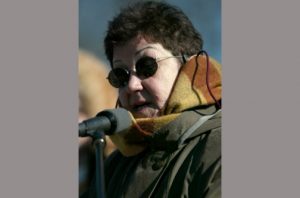Norma McCorvey, the plaintiff in the case that led to the Supreme Court’s landmark Roe v. Wade ruling that legalized abortion in the United States in 1973, died Saturday. She was 69.
She died of heart failure in a Texas assisted-living facility, said Joshua Prager, a New York journalist who has written about her in Vanity Fair magazine.
McCorvey was known as “Jane Roe” in the case as she fought for the constitutional right to an abortion, a hot-button social issue that has divided the American public roughly in half for decades.

She became a hero to abortion rights supporters but a villain to those seeking to outlaw abortion. Years later in 1995, she announced she had switched her allegiance to the anti-abortion movement.
The Roe v Wade decision was handed down on January 22, 1973 with seven justices backing it and two dissenting.
In the four decades since the Supreme Court ruling, tens of millions of legal abortions have been performed in the country.
The ruling ended a lengthy legal drama that had begun in the state of Texas three years earlier, where abortions were permitted only in cases in which pregnancies endangered the mothers or children.
A single mother who had had a rough childhood, McCorvey was pregnant for a third time and wanted an abortion.
Encouraged by two feminist lawyers, she filed suit against Dallas district attorney Henry Wade over the Texas law under the pseudonym Jane Roe.
Although her child was born, the case took on a life of its own, becoming one of the most important and best-known decisions ever made by the Supreme Court.
McCorvey later became a fervent abortion opponent, converting to evangelical Protestantism and then Catholicism. She also declared herself a lesbian.
Marjorie Dannenfelser — president of the Susan B Anthony List, an organization that seeks to roll back abortion rights — offered the group’s condolences in a statement and praised McCorvey’s shift in views.
“She overcame the lies of the abortion industry and its advocates and spoke out against the horror that still oppresses so many,” Dannenfelser wrote.
“In her memory and in her honor, we will carry on that work and we pray for her eternal peace.”
